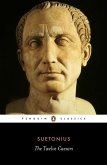Suetonius'Äô "The 12 Caesars" offers a captivating exploration of the lives and reigns of the first twelve emperors of Rome, from Julius Caesar to Domitian. Written in a succinct and engaging prose style, Suetonius employs a biographical approach that interweaves anecdotes, political intrigue, and personal vices, illuminating the complexity of power dynamics in ancient Rome. His narrative is marked by an undeniable wit, reflecting the literary context of the early second century AD, where historical narrative sought to entertain as well as inform. The work serves not only as a political history but also as a keen psychological study of its subjects, revealing the interplay between personal character and imperial power. Suetonius, an accomplished Roman biographer and historian, lived during a time when the Roman Empire was transitioning into its imperial phase. His proximity to the imperial court and his role under Emperor Hadrian likely provided him with unique insights into the lives of these rulers. Suetonius'Äô extensive research, combined with his keen observational skills, resulted in a nuanced portrayal of each emperor'Äôs contributions and failings. I highly recommend "The 12 Caesars" to anyone interested in Roman history, political biography, or the intricacies of human nature under power. It offers not only invaluable historical insights but also serves as a timeless reminder of the fragility of authority and the complexities of leadership.
Dieser Download kann aus rechtlichen Gründen nur mit Rechnungsadresse in A, B, BG, CY, CZ, D, DK, EW, E, FIN, F, GR, H, IRL, I, LT, L, LR, M, NL, PL, P, R, S, SLO, SK ausgeliefert werden.









